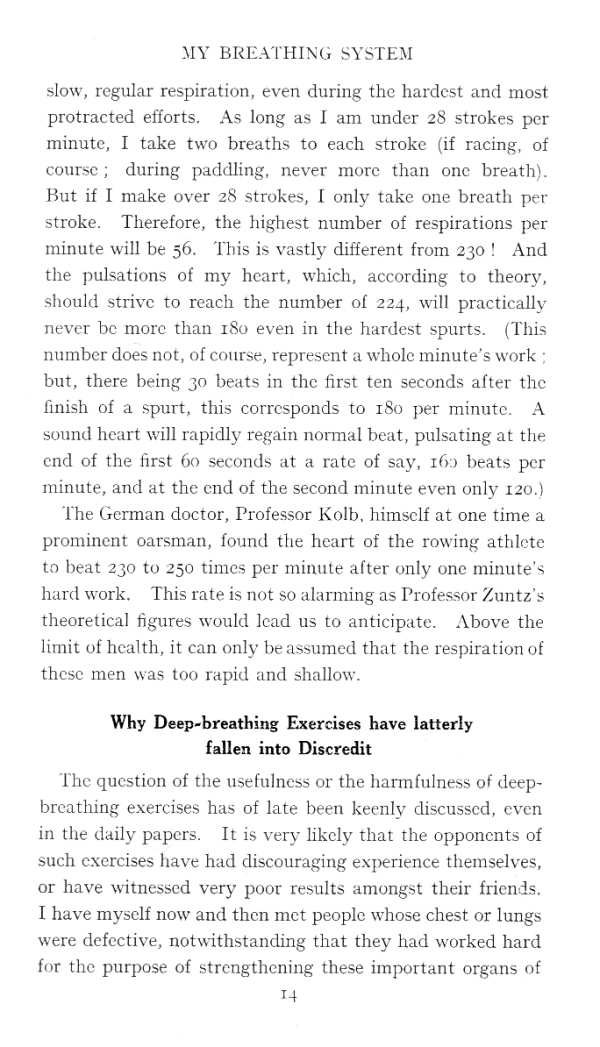mbs 014

MY BREATHING SYSTEM
slow, regular respiration, even during the hardcst and most protracted efforts. As long as I am under 28 strokes per minutę, I take two breaths to each stroke (if racing, of coursc; during paddling, never morę than one breath). But if I make over 28 strokes, I only take one breath per stroke. Therefore, the highest number of respirations per minutę will be 56. This is vastly different from 230 ! And the pulsations of my hcart, whicli, according to theory, should strivc to reach the number of 224, will practically nevcr be morę than 180 even in the hardest spurts. (This number does not, of course, represent a wholc minute's work ; but, there being 30 beats in the first ten seconds after the Tinish of a spurt, this corrcsponds to 180 per minutę. A sound heart will rapiclly regain normal beat, pulsating at the end of the lirst 60 seconds at a ratę of say, if>:> beats per minutę, and at the end of the second minutę even only 120.)
The German doctor, Professor Kolb, himsclf at one time a prominent oarsman, found the heart of the rowing athlcte to beat 230 to 250 times per minutę after only one minute’s hard work. This ratę is not so alarming as Professor Zuntzs theoretical tigures would lead us to anticipate. Above the limit of health, it can only beassumed that the respiration of thesc men was too rapid and shallow.
Why Deep-breathing Exercises have latterly fallen into Discredit
The ąuestion of the usefulness or the harmfulness of deep-breathing exefcises has of late been keenly discusscd, cven in the daily papers. It is very likcly that the opponents of such cxercises liave had discouraging exj>erience themselves, or have witnessed very poor results amongst their friends.
I have mysclf now and then met peoplc whose chest or lungs were defcctive, notwithstanding that they had worked hard for the purpose of strengthening these important organs of
14
Wyszukiwarka
Podobne podstrony:
mbs 090 MY BREATHING SYSTEM EXERCISE No. 3. Fuli breatbing during twisting of trunk to alternate sid
mbs 084 MY BREATHING SYSTEM tliercfore, to be performed with the l)ody in difterent positions. At Wh
mbs 066 MY BREATHING SYSTEM Dr. Halls Dally’s “ Fuli Cycle of Complete Respiration ” is the second c
mbs 005 MY BREATHING SYSTEM BYLIEUT. J. P. MI LLER, K.D. Author of My System," " My System
mbs 011 MY BREATHING SYSTEM and violent palpitatiops. Sncli an overstrained licart could never last
mbs 022 MY BREATHING SYSTEM against the invasion and throw ol f thc gernis, which arc ejected with t
mbs 027 MY BREATHING SYSTEM sucked in. For persons who lind it very difficult to acquire tłiis contr
mbs 035 MY BREATHING SYSTEM How to Expand and Contract the Thorax to its fullest Extent The thoracic
mbs 038 MY BREATHING SYSTEM scientiiically established this fact. He said, in a recent lecture : &qu
mbs 040 MY BREATHING SYSTEM expansiou alone gives tlić best result, others, Jikt* the French lieuteu
więcej podobnych podstron